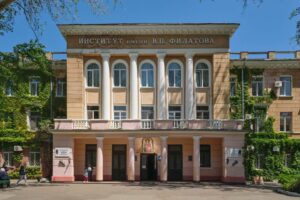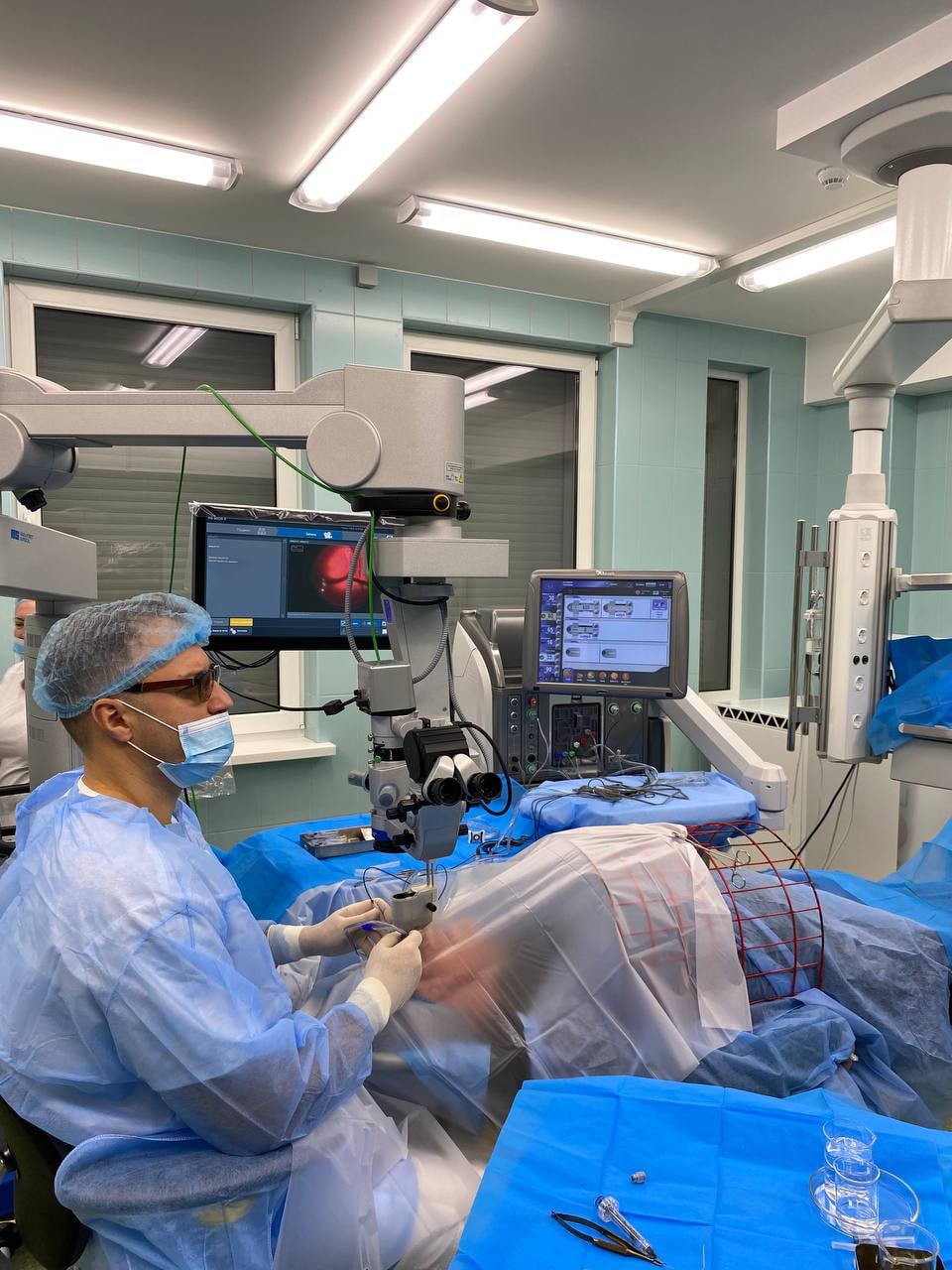
Research into the treatment of combat eye injuries is a unique experience for Ukrainian ophthalmologists, which is in demand internationally, according to Oleg Zadorozhny, senior researcher at the Filatov Institute of Eye Diseases and Tissue Therapy in Odessa, Ukraine.
“Everything related to the diagnosis and treatment, including surgery, of combat eye injuries is promising and a priority. This is a unique experience for our department of post-traumatic eye pathology. Until now, there has been little such experience in the world, so the results of our specialists’ research in the field of combat eye injuries are highly valuable,” he said in an interview with Interfax-Ukraine.
He also noted that the most sought-after areas internationally include the diagnosis and treatment of pediatric ophthalmic pathology, in particular retinoblastoma, retinopathy of prematurity, and research in ophthalmic oncology.
“Fundamental research that brings us closer to understanding the etiology and pathogenesis of ophthalmic diseases opens up new possibilities for diagnosis and treatment,” he said.

Mobile teams from the V.P. Filatov Institute of Eye Diseases and Tissue Therapy of the National Academy of Sciences of Ukraine have made more than 600 visits to hospitals and perinatal centers over the past four years to diagnose and treat premature newborns, according to Filatova. Filatov Institute of Eye Diseases and Tissue Therapy of the National Academy of Medical Sciences of Ukraine have made more than 600 visits to hospitals and perinatal centers to diagnose and treat premature newborns, according to Oleg Zadorozhny, senior researcher at the Filatov Institute of Eye Diseases and Tissue Therapy of the National Academy of Medical Sciences of Ukraine.
“Our specialists have gained a lot of experience by traveling with the appropriate equipment to regional hospitals and perinatal centers to diagnose and treat severely premature babies. Over the past four years, more than 600 visits to hospitals have been made, more than 1,500 premature newborns have been screened, and about 200 telemedicine consultations have been conducted,” he said in an interview with the Interfax-Ukraine news agency.
Zadorozhny noted that helping premature newborns with retinopathy in the southern region of Ukraine has become the goal of a joint project with the charity “I Want to See. Southern Region,” under which the Institute has created a Center for the Prevention of Childhood Blindness due to Retinopathy of Prematurity and purchased expensive scientific and clinical equipment.
He added that the Institute’s scientists represent Ukraine in global research on the evaluation of the results of treatment of retinopathy of prematurity in Europe and worldwide as part of international research groups (FIREFLEYE next Study Group and European ROP registry), which are engaged in the study, diagnosis, and development of modern effective methods for the treatment of retinopathy of prematurity.
Source: https://interfax.com.ua/news/interview/1071616.html?utm_source=telegram

Despite the ongoing war, the Filatov Institute of Eye Diseases and Tissue Therapy in Odessa is actively participating in international scientific projects. This was reported by Oleg Zadorozhny, MD, senior researcher at the institute, in an exclusive interview with the Interfax-Ukraine news agency.
“In recent years, scientists from the Institute have participated in nine global international research projects,” Zadorozhny said. He emphasized that this is recognition of the relevance and significance of the scientific work carried out at the Institute.
According to him, participation in such projects allows for the exchange of experience with foreign colleagues, the introduction of advanced methods of diagnosis and treatment, and the improvement of medical care for patients.
“The institute has not only remained on the forefront of global ophthalmological science, but is, on the contrary, in a leading position,” Zadorozhny added.
Source: https://interfax.com.ua/news/interview/1071616.html?utm_source=telegram

The V.P. Filatov Odessa Institute of Eye Diseases and Tissue Therapy is actively introducing innovative technologies, including artificial intelligence and telemedicine, into ophthalmic practice. This was announced by Oleg Zadorozhny, MD, senior researcher at the institute, in an exclusive interview with the Interfax-Ukraine news agency.
“We are conducting multidisciplinary research in the field of artificial intelligence for screening diabetic retinopathy in partnership between the Institute, Odessa National Medical University, and international companies,” Zadorozhny said.
He emphasized that the introduction of telemedicine technologies allows for remote diagnosis and consultation of patients, which is especially important in conditions of limited access to medical facilities during military operations.
“The institute is addressing medical science issues that are currently the most pressing in Ukraine and around the world,” Zadorozhny added.
Source: https://interfax.com.ua/news/interview/1071616.html?utm_source=telegram

The Filatov Institute of Eye Diseases and Tissue Therapy in Odessa continues its active scientific work despite the ongoing war. This was reported by Oleg Zadorozhny, Doctor of Medical Sciences and senior researcher at the institute, in an exclusive interview with the Interfax-Ukraine news agency.
“Despite all the difficulties of today, the ongoing war, and the existing direct threats and risks, the Filatov Institute continues its scientific and research activities,” Zadorozhny said.
According to him, the institute continues to conduct both fundamental and applied research aimed at developing new methods for the diagnosis and treatment of ophthalmic diseases, including cataracts, glaucoma, corneal and retinal diseases, pediatric ophthalmopathology, and combat eye injuries.
“The institute has not only remained at the forefront of global ophthalmological science, but is, on the contrary, in a leading position,” Zadorozhny emphasized. He added that the institute’s scientists have participated in nine global international research projects in recent years.
The institute has ten scientific departments and six specialized laboratories working in various fields of ophthalmology. Particular attention is paid to the introduction of innovative technologies, such as artificial intelligence and telemedicine, to improve the diagnosis and treatment of patients.
“The mission of the Institute’s scientific activities can be summed up in the words of Vladimir Petrovich Filatov: ‘All means of science are for the treatment of the sick,’” Zadorozhny concluded.
Source: https://interfax.com.ua/news/interview/1071616.html?utm_source=telegram

Ophthalmologists at the Filatov Institute of Eye Diseases and Tissue Therapy of the National Academy of Medical Sciences of Ukraine (Odesa) performed the world’s first surgery to remove an intraocular hemangioma in a child. For the first time in the world, the Filatov National Institute of Robotics and Tissue Therapy of the National Academy of Medical Sciences of Ukraine (Odesa) performed a surgery to remove a large intraocular choroidal hemangioma in a child.
The institute told Interfax-Ukraine that the operation was performed by Mykola Umanets, MD, head of the Department of Retinal and Vitreous Pathology.
“Surgical removal of intraocular hemangiomas is not performed due to the very high risk of bleeding and the lack of effective methods to stop it. All modern methods of treating intraocular hemangiomas are aimed at stopping the growth and destruction of the tumor and are effective in the case of small tumors. In cases of large tumors, the only way to solve the problem is to remove the eye,” the institute emphasized.
The operation was performed on a 13-year-old patient. In August 2023, during an eye examination before school, the patient complained of a partial loss of visual field, but there were no complaints of visual impairment and he did not seek medical attention. During the examination in August 2024, doctors found that the vision in the left eye had significantly decreased. During the examination at the Filatov Institute, an almost complete detachment of the retina and a hemangioma under it were found. The situation was complicated by the patient’s young age (at a young age, tumors grow rapidly and behave much more aggressively), untimely treatment, large size of the tumor and unfortunate location almost close to the optic nerve, development of a large retinal detachment with loss of vision.

In 2020, the Filatov Institute removed a large hemangioma from an adult patient for the first time in the world, and it was also the first in the world.
“Just like in 2020, we relied on a unique method of high-frequency electric welding of biological tissues in ophthalmology, developed by scientists of the Filatov Institute together with specialists of the E.O. Paton Institute of Electric Welding, which allows us to remove a hemangioma in an adult patient at the Filatov Institute. The new method allows to remove a hemangioma in an adult patient at the E.O. Paton Institute and significantly reduces the risk of bleeding with the help of unique tools developed by specialists of the two institutes. During the operation, each dissected vessel was “brewed” to prevent bleeding,” the institute noted.
Hemangiomas are benign tumors in various parts of the body caused by abnormal growth of blood vessels and are practically penetrated by them. Hemangiomas can also form in the internal organs, in particular (very rarely) in the choroid (choroid). They do not threaten the patient’s life, but are accompanied by a significant decrease in vision and can cause the development of serious complications, such as retinal detachment, hemorrhages in the eye cavity, and increased intraocular pressure (glaucoma).
Prior to the successful surgery performed by the ophthalmologists of the Filatov Institute in 2020, the world had recorded the only case of surgical removal of an intraocular hemangioma: In 2019, Italian ophthalmologist Barbara Parolini performed surgery to remove a small tumor in an adult patient.
Source: https://interfax.com.ua/